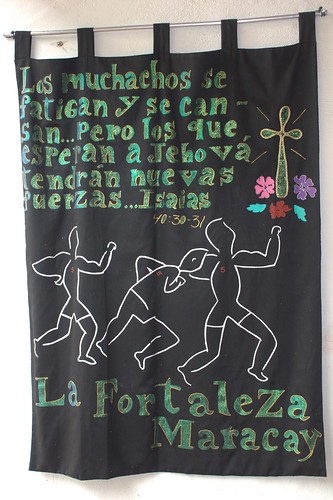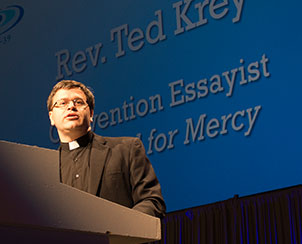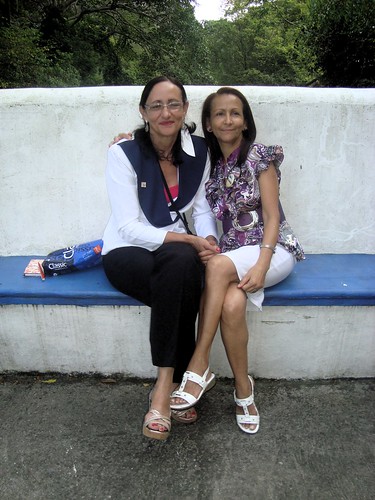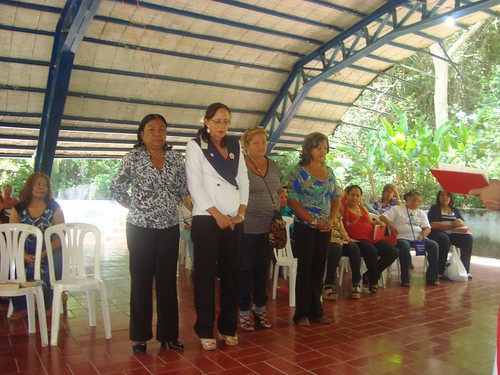 From August 20 to 23, 2013, Luz Maria
and I attended a short course on ecclesiology (theology of the
church) taught by Mark Braden, pastor of historic Zion Evangelical Lutheran Church of Detroit, Michigan.
From August 20 to 23, 2013, Luz Maria
and I attended a short course on ecclesiology (theology of the
church) taught by Mark Braden, pastor of historic Zion Evangelical Lutheran Church of Detroit, Michigan.
Zion Detroit was founded on June 4, 1882, by a group composed mostly of German immigrants from West Prussia, now a part of Poland (this is the region from which my great-great-grandparents emigrated in 1839). By the early 1890s, the congregation had almost 3,100 parishioners, and was, at the time, the largest congregation in The Lutheran Church Missouri Synod, which it had joined in 1883 (of course, at the time the LCMS was not named the LCMS, but rather the Evangelical Lutheran Synod of Missouri, Ohio and Other States).

Pastor Braden is an adjunct member of the faculties of Concordia Theological Seminary, Fort Wayne, Indiana, and of Concordia University Ann Arbor, Michigan, He teaches Biblical Greek online for the seminary, and New Testament for the university. Pastor Braden speaks fluent Spanish from having spent his childhood in Cadiz, Spain, where his father, an office in the U.S. Navy, was stationed. It always is a privilege to study under qualified instructors provided by the Lutheran Church of Venezuela's Juan de Frias Theological Institute. La Fortaleza Lutheran Church of Maracay, Venezuela, hosted the seminar. This is the church where Luz Maria and I had our marriage solemnized (because in Venezuela, first you are legally married in a civil ceremony and later, if you desire, there is a service of blessing in the church).
 |
Edgar Coronado, the current pastor of La Fortaleza, was one of the first Venezuelans that I met when I toured the country in April 2003, before I began my long-term service that July. So it was with many fond memories that we traveled to Maracay.
Luz Maria and I did a presentation on the pastoral office, comparing the treatment of the subject in John Theodore Mueller' s "Christian Dogmatics" and chapter 6 of Sergio Fritzler's “El Oficio Pastoral”.
Mueller was a professor at Concordia Seminary, St. Louis, from 1920 to 1964. His book is an abridged English version of Franz Pieper's classic three-volume work, Christliche Dogmatik. It was the first English translation of Pieper's work, and was, in turn, translated into Spanish by Andrés A. Melendez, founder of the Spanish Lutheran Hour (Cristo Para Todas Las Naciones).
I remember reading the complete, unabridged English translation of Pieper's work by T. Engelder, J. T. Mueller; and W. W. F. Albrecht in my father's study years ago when I was a boy. It was a major influence on my thinking. Pieper, by the way, was also a native of Pomerania, the land of my ancestors. He was born west of Danzig (now known as Gdansk).
Sergio Fritzler serves as director of Concordia Seminary in Buenos Aires, Argentina, the seminary of la Iglesia Evangélica Luterana Argentina (IELA) (Evangelical Lutheran Church in Argentina). The chapter that we were assigned from Fritzler's book is more of a historical overview in the way perceptions of the pastoral office have changed from the time of Constantine (fourth century A.D.) until the present, while Mueller's handbook of systematic theology deals the topic in a more abstract way.

Nevertheless Luz Maria and I recognized a common theme: We Lutherans believe in apostolic succession, although in a manner different than that of the Roman Catholic Church. Christ Himself instituted the office of pastor to continue the work of the apostles: Preaching and teaching the apostolic doctrine and administering the sacraments. God calls and places men into the ministry of Word and sacrament using the church as an instrument. However, the right of apostolic succession is based on fidelity to the Holy Scriptures, not on an historic episcopate supposedly dating back in an unbroken line to the time of the apostles.
Luz Maria elected president of women's organization
From Sept. 5 to 8, 2013, Luz Maria attended the national convention of Sociedad Luterana de Damas Venezolanas (SOLUDAVE), the Lutheran Church of Venezuela's women's organization. It took place at a retreat center near Barquisimeto, with the focus being on a study of the prophetess Deborah in the Book of Judges and the role of women in the church. Luz Maria was elected president of the organization.


No comments:
Post a Comment